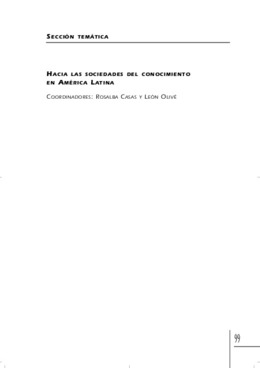Mostrar el registro sencillo del ítem
Presentación [del dossier : Hacia las sociedades del conocimiento en los países culturalmente diversos]
| dc.creator | Olivé, León | |
| dc.date.accessioned | 2017-08-29T17:32:27Z | |
| dc.date.available | 2017-08-29T17:32:27Z | |
| dc.date.issued | 2007-12 | |
| dc.identifier.citation | Olivé, L. (2007). Presentación [del dossier : Hacia las sociedades del conocimiento en los países culturalmente diversos]. Redes, 13(26), 101-110. | es |
| dc.identifier.issn | 0328-3186 (impresa) | es |
| dc.identifier.issn | 1851-7072 (en línea) | es |
| dc.identifier.uri | http://ridaa.unq.edu.ar/handle/20.500.11807/530 | |
| dc.description | Fil: Olivé, León. Universidad Nacional Autónoma de México. Instituto de Investigaciones Filosóficas; México. | |
| dc.description.abstract | Durante la segunda mitad del siglo XX ocurrieron cambios, debidos en gran medida al desarrollo y uso del conocimiento científico y tecnológico, que han tenido notables efectos en la economía, la educación y la cultura, generando un entorno social con rasgos distintos a la sociedad industrial. El concepto de sociedad del conocimiento se ha venido usando con insistencia para referirse a ese nuevo entorno social, aunque según los intereses académicos, económicos, políticos o culturales, este concepto se entiende en sentidos diferentes. El uso del concepto de sociedad del conocimiento a veces crea desconcierto, pues se dice con razón que ninguna sociedad humana habría podido sobrevivir sin algunos conocimientos sobre su entorno y sobre sí misma, y el hecho de que los seres humanos guíen en gran medida su interacción con el entorno y entre ellos mismos por medio de conocimientos es tan antiguo como la humanidad y no representa novedad histórica alguna. Pero las transformaciones de las últimas décadas sí incluyen algunos rasgos inéditos en la historia humana. Por ejemplo –si bien esto no está bien estudiado y comprendido–, existen buenas razones para creer que han surgido nuevos agentes productores de conocimiento, tales como nuevos tipos de sistemas y de redes epistémicas, los cuales son novedosos no sólo en un sentido sociológico, sino en uno estrictamente epistemológico; también han aparecido nuevas formas de generación, distribución y uso del conocimiento, todo lo cual ha tenido un muy fuerte impacto en la producción y en las relaciones económicas, dando lugar también a problemas éticos y políticos que la humanidad no había enfrentado antes (como los que plantean las ciencias genómicas, por ejemplo). | es |
| dc.description.abstract | During the second half of the 20th century, changes occurred, largely due to the development and use of scientific and technological knowledge, which have had notable effects on the economy, education and culture, generating a social environment with features different from the industrial society. . The concept of knowledge society has been used insistently to refer to this new social environment, although depending on academic, economic, political or cultural interests, this concept is understood in different senses. The use of the concept of knowledge society sometimes creates confusion, since it is rightly said that no human society could have survived without some knowledge about its environment and about itself, and the fact that human beings largely guide their interaction. with the environment and among themselves through knowledge is as old as humanity and does not represent any historical novelty. But the transformations of recent decades do include some unprecedented features in human history. For example – although this is not well studied and understood – there are good reasons to believe that new knowledge-producing agents have emerged, such as new types of systems and epistemic networks, which are novel not only in a sociological sense, but in a strictly epistemological one; New forms of generation, distribution and use of knowledge have also appeared, all of which has had a very strong impact on production and economic relations, also giving rise to ethical and political problems that humanity had not faced before (such as proposed by genomic sciences, for example). | |
| dc.format | application/pdf | es |
| dc.language | spa | es |
| dc.publisher | Universidad Nacional de Quilmes | es |
| dc.rights | https://creativecommons.org/licenses/by-nc-nd/2.5/ar/ | es |
| dc.source | Redes | es |
| dc.subject | Conocimiento | es |
| dc.subject | Sociedad | es |
| dc.subject | Diversidad cultural | es |
| dc.subject | Sociedad de la información | es |
| dc.subject | Knowledge | es |
| dc.subject | Society | es |
| dc.subject | Cultural diversity | es |
| dc.subject | Information society | es |
| dc.subject | Conhecimento | es |
| dc.subject | Sociedade | es |
| dc.subject | Diversidade cultural | es |
| dc.subject | Sociedade da informação | es |
| dc.title | Presentación [del dossier : Hacia las sociedades del conocimiento en los países culturalmente diversos] | es |
| dc.type | info:ar-repo/semantics/reseña artículo | es |
| unq.blm.ubicacion | P-AR-RED1 | es |
| unq.articulos.paginicio | 101 | es |
| unq.articulos.pagfinal | 110 | es |
| unq.revista.numero | 26 | es |
| unq.revista.volumen | 13 | es |
| unq.version | info:eu-repo/semantics/publishedVersion | es |
| unq.articulos.seccion | Sección temática | es |
| unq.tipo.snrd | info:eu-repo/semantics/article | es |
| unq.acceso | info:eu-repo/semantics/openAccess | es |
Ficheros en el ítem
Este ítem aparece en la(s) siguiente(s) colección(ones)
-
Vol. 13, no. 26
Publicada en diciembre de 2007.

